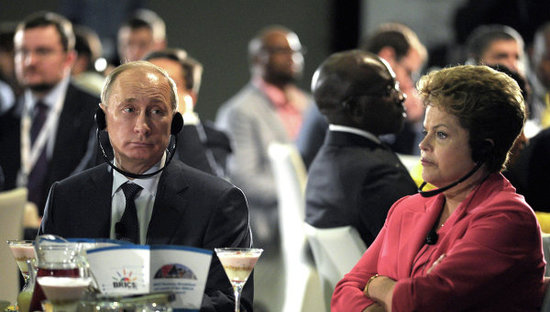While it is still unclear whether Russia pursues the occupation of additional parts of eastern Ukraine, there is a growing certainty that developments over the past month will have a lasting effect on the international system. The most immediate consequences are probably the strengthening of the NATO alliance and an acceleration of trade negotiations between the European Union and the United States. Cuts in defense spending in both the United States and Europe may be partially halted as a consequence. While trade between Russia and the West makes a new Cold War scenario highly unlikely, Vladimir Putin is likely to remain one of the world’s greatest villains in the eyes of the West for years. This will make meaningful progress vis-à-vis the crises in Iran and Syria more difficult to achieve.
This new scenario is bound to lower expectations for the 6th BRICS Summit even further. While the greatest part of sectoral intra-BRICS cooperation (e.g. between agriculture specialists) is unlikely to be affected much, the symbolism of the yearly encounter of leaders matters greatly as well. At the 5th BRICS gathering in Durban last year, procedural snags and delays (Brazil’s President Dilma waited for hours to meet South Africa’s President Zuma, whose meeting with Putin went overtime) negatively affected intra-BRICS harmony.
Yet this year, the summit’s Brazilian host will have to manage a far more complex dynamic. President Putin, likely to be excluded from the G8 meeting, will seek to use the BRICS Summit in Fortaleza as proof that he is not internationally isolated. Rousseff, on the other hand, will seek to avoid being seen much with the Russian President. After all, in an election year, the opposition, human rights NGOs and gay rights activists are likely to use the encounter to criticize President Rousseff for being soft on dangerous autocrats. The government will do everything to avoid the protests that ensued when President Lula hosted Iran’s President Mahmoud Ahmadinejad in 2009 – one of the rare moments when foreign policy was at the center of Brazil’s domestic political debate.
In addition, critics will use the presence of the Chinese and Indian leader to underline that the Brazilian economy has grown much slower in comparison. With the political and economic crisis in Venezuela, President Rousseff is already facing the most complex foreign policy challenge since taking office, and her hands-off strategy has been roundly criticized. A far less secure international actor than her predecessor, she is highly unlikely to support any bold moves at the BRICS Summit.
In these difficult circumstances, the summit’s peculiar timing – two days after the World Cup final at Rio de Janeiro’s Maracanã Stadium – might help the government turn the BRICS gathering into a tiny sideshow, fully eclipsed by either national euphoria or mourning – depending on the final game’s result.
Read also:
Two days after final at Maracanã, BRICS leaders will meet in Fortaleza
Why the anti-BRICS hype is overblown
The BRICS and the Future of R2P: Was Syria or Libya the Exception?
Photo credit: AP Photo/RIA-Novosti, Alexei Druzhinin, Presidential Press Service









